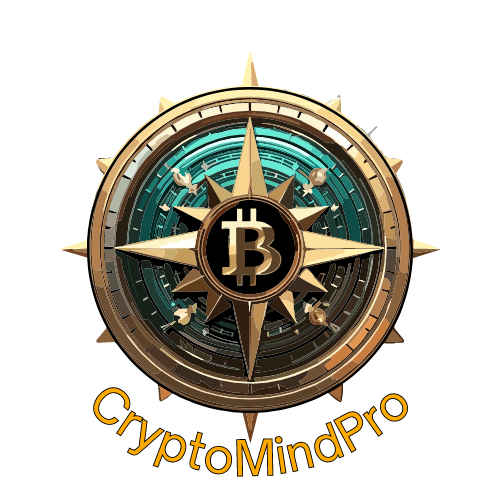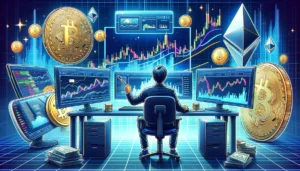The dawn of decentralized finance (DeFi), with its unparalleled blend of transparency and flexibility, has sparked a financial revolution that defies traditional banking paradigms. Embracing the potential of DeFi economic models, this nascent landscape thrives on the robust architecture of blockchain, opening doors to a world where the economic impact of smart contracts can be felt across the globe. As we dissect the intricate cryptocurrency market dynamics, we uncover the pillars of DeFi economic growth—a testament to the power and potential of digital financial instruments.
At the heart of this transformative movement lies a commitment to inclusive financial prosperity. Driven by the inherent resilience of blockchain technologies, DeFi continues to demonstrate steadfast growth; amidst market fluctuations, these decentralized systems offer a compelling alternative to fiat currencies with their capacity for expansive economic influence. It is in this progressive realm that the monetary traditions of old are reborn—reimagined and reinvigorated by the potent forces of decentralization.
Key Takeaways
- Understanding DeFi economic models is crucial to grasping blockchain’s transformative power.
- Smart contracts provide the foundation for DeFi, bolstering its economic growth.
- The resilience of DeFi is showcased through continued advancement even amidst cryptocurrency market dynamics.
- Decentralization poses a formidable challenge to classical financial principles, promising significant economic growth.
- Exploring the economic impact of smart contracts reveals opportunities for innovation and inclusivity in finance.
The Rise of Decentralized Finance: Understanding DeFi’s Impact
As the tide of decentralized finance surges forward, we witness a paradigm shift in the very fabric of economic systems. The lexicon of finance is redefined by DeFi economic principles, promising freedom from traditional financial shackles. This section delves into the foundational aspects of DeFi and contrasts them with conventional banking operations, followed by an analysis of the prevailing market trends that signify the industry’s growth.
The Fundamentals of DeFi Economic Models
At the core of DeFi ecosystem studies lies the innovative economic model that is distinct from the traditional monetary systems. Utilizing the prowess of cryptocurrencies and smart contracts, decentralized finance deploys automated, secure transactions on its distributed ledger technology. These DeFi economic principles eliminate costly intermediaries and democratize finance by offering a spectrum of services including loans, insurance, and investments directly between parties.
Decentralized Finance vs. Traditional Banking: A Comparative Analysis
Comparing DeFi industry analysis to traditional banking reveals stark contrasts. Where banking systems are laden with regulatory frameworks, centralized controls, and intermediary fees, DeFi operates with an unparalleled level of transparency and directness. This not only slashes transaction expenses but also enhances speed and accessibility, fostering an environment where financial services are truly for the many, not the few.
DeFi Market Trends and Growth Indicators
Analyzing DeFi market trends and growth indicators is a testament to its robustness and potential. The ascending trajectory of asset volumes managed through DeFi protocols and the swelling user base underline the decentralized finance economics success story. These trends reflect a burgeoning confidence amongst users and investors, poised to redefine the future of financial transactions and services.
The Economics of DeFi: Where Digital Assets Meet Financial Services
The decentralization of finance has been nothing short of revolutionary, redefining interactions between digital assets and financial services. This evolution in finance, propelled by DeFi economic research, has given rise to a system that values efficiency and inclusivity. It’s within this novel framework that we perform DeFi financial analysis, an essential tool for understanding the burgeoning landscape. By exploring DeFi’s economic underpinnings, we can appreciate the role of smart contracts and the economic impact they have on the industry.
DeFi leverages cryptocurrencies and tokenized assets, which offer individuals more autonomy over their financial transactions than traditional banking systems ever could. As more individuals and institutions adopt these digital assets, it becomes clear that DeFi economic principles have the potential to not only challenge but also elevate our existing financial norms.
Significant attention must be given to the integral role of smart contracts within the DeFi space. These programmable and self-executing agreements are the backbone of DeFi, facilitating transparent and secure transactions. The economic impact of smart contracts cannot be overstated; their robustness ensures the integrity and smooth operation of countless DeFi services.
Another critical area of DeFi economic research concerns the liquidity of digital assets. Fluid access to these assets is paramount for the smooth operation of DeFi services. Such liquidity considerations, coupled with emerging regulatory frameworks, demand constant scrutiny to understand how they’ll shape the future of DeFi.

In the ever-evolving DeFi domain, it remains crucial to stay informed on current regulations and the advancements of smart contract technologies. Through these avenues of research, we can gauge DeFi’s economic sustainability and its potential implications on global financial services.
Strategies for Investment: Navigating the Waters of DeFi
Investing in decentralized finance, or DeFi, is akin to charting unknown seas. With its unique combination of innovation and volatility, understanding DeFi investment strategies is crucial for those looking to leverage the full potential of this burgeoning field. As an investor, it’s imperative to monitor not only the rapid cryptocurrency market dynamics but also the intrinsic value and growth prospects DeFi platforms command. Let’s set sail as we explore how to navigate these digital waters with an informed and strategic approach.
Smart Contracts and Their Economic Impact on DeFi
Smart contracts stand as the cornerstone of the DeFi ecosystem. These automated, self-enforcing agreements facilitate transactions with unprecedented transparency and speed, greatly reducing the need for intermediaries. Their implementation has been transformative, directly contributing to DeFi economic growth. For investors, smart contracts are not just tools for efficiency; they represent a shift towards a more open financial market where trust is built into the code.
DeFi Economic Research: Metrics for Investment and Risk Assessment
To successfully invest in DeFi, one must dive deep into DeFi economic research. This involves analyzing metrics that assess performance, risks, and long-term sustainability of DeFi projects. By understanding these factors, investors can better predict market behavior and potential return on investments, all while managing exposure to the inherent risks associated with early-stage technologies and market fluctuations.
Cryptocurrency Market Dynamics and DeFi Integration
The integration of cryptocurrencies with DeFi platforms has amplified the complexity of market dynamics. As these two facets become more intertwined, discerning investors observe and analyze how market sentiment, regulatory news, and technological advancements affect pricing and adoption rates. Recognizing the correlation between cryptocurrencies’ volatility and DeFi’s growth prospects is pivotal in devising investment strategies that are not only robust but also capable of yielding substantial returns in this dynamic digital finance avenue.
Frequently Asked Questions
| Question | Answer |
|---|---|
| What is the economic effect of DeFi? | DeFi (Decentralized Finance) has a significant economic impact by creating a more inclusive financial system. It eliminates intermediaries, reduces costs, and increases efficiency in financial transactions. However, it also presents challenges like regulatory uncertainty and market volatility. |
| What are the downsides of DeFi? | The downsides of DeFi include a higher risk of fraud due to lack of regulation, potential for money laundering, market volatility, and technological risks like smart contract vulnerabilities. Consumer protection is also less robust compared to traditional finance. |
| Is DeFi the future of finance? | DeFi has the potential to shape the future of finance by offering decentralized, efficient, and transparent financial services. However, its long-term role depends on addressing current challenges like regulatory compliance, scalability, and security. |
| Is DeFi a good investment? | Investing in DeFi can offer high returns but comes with high risks. It’s suitable for those who understand the technology and are willing to accept the volatility and regulatory uncertainties. As with any investment, it’s crucial to conduct thorough research and consider diversification. |




